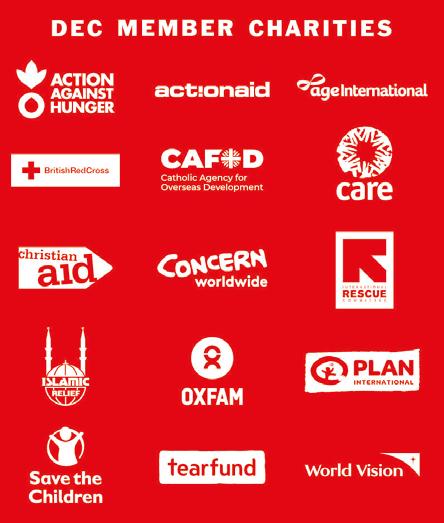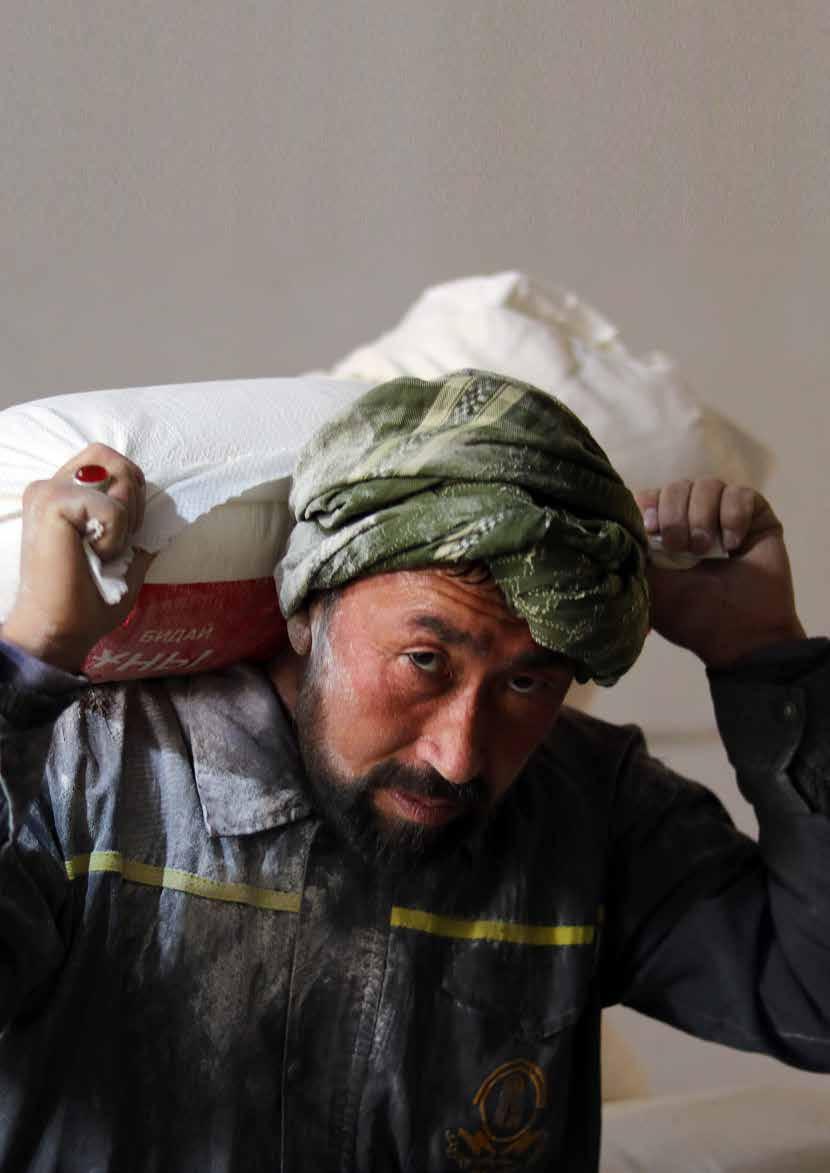
SIX-MONTH REPORT PUBLISHED NOVEMBER 2022 DECEMBER 2021 – JUNE 2022
AFGHANISTAN CRISIS APPEAL 2021
Decades of conflict, instability, and climate shocks such as droughts and floods, had already left more than 90% of the population surviving on only $2 a day. Across the country, the pandemic had catastrophic consequences for people’s health, incomes and levels of debt, and put immense strain on the already struggling health system.
In July 2020, the DEC launched its Coronavirus Appeal to support families in some of the world’s most vulnerable communities, including in Afghanistan. DEC funds were used to provide people in Afghanistan with vital water, sanitation, and hygiene support, as well as cash, food, and nutrition support in the face of the ongoing hunger and malnutrition crisis.
In 2021, the situation for Afghanistan’s people went from bad to worse. The renewed conflict that led to a change of government pushed the country to the brink of economic collapse, with increased displacement of families from their homes, loss of jobs and livelihoods, and soaring food prices as the worst drought in 27 years ruined much of the country’s wheat crops.
More than half of the population – nearly 23 million people – did not have enough to eat, and more than 8 million people were on the brink of famine.
David Beasley, Executive Director of the World Food Programme, described the situation as the worst humanitarian crisis on earth and called for urgent action by the international community.1
As winter loomed, it was clear to the DEC that the people of Afghanistan needed more support than could be provided through the funds allocated from the Coronavirus Appeal. The DEC’s Afghanistan Crisis Appeal was therefore launched on 15 December 2021 to respond to the urgent and growing needs of Afghanistan’s most vulnerable communities. 5.7
People wear face masks to protect themselves from Covid-19 at a cash distribution by a DEC member charity in late 2021.
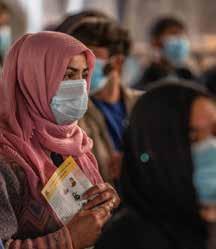
• economic collapse due to the combined impacts of political turmoil, the Covid-19 pandemic and the global economic recession
> leading to loss of jobs and livelihoods at the same time as rapidly increasing prices of food and other necessities
• agricultural collapse due to the worst drought in 27 years and rising costs of seeds and other inputs
> leading to a shortage of food supplies and loss of income for the majority of the population who rely on agriculture for a living
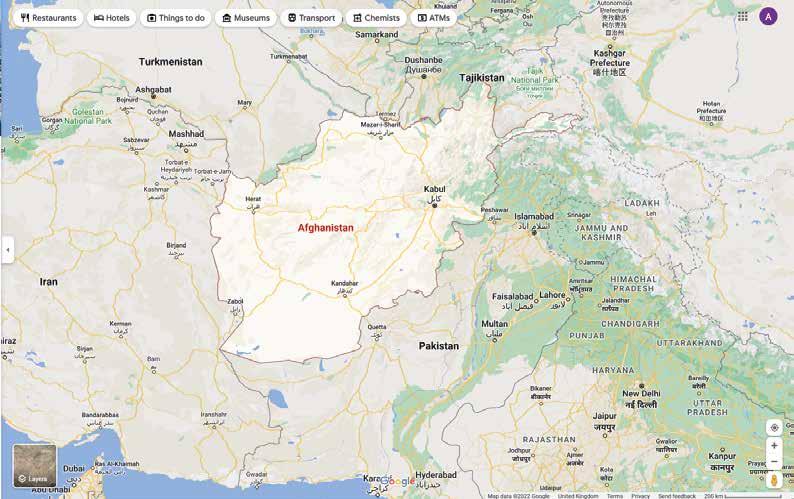
• ongoing insecurity and instability due to conflict and change of government
million
people were internally displaced having fled their homes due to conflict, violence or natural disasters
Source: Integrated Food
© Osman Khayyam/DEC
> leading to huge numbers of internally displaced people without any means to provide for themselves or their families.
Phase 4 – Emergency Phase 3 – Crisis Acute Food Insecurity November 2021 – March 2022 PAKISTAN IRAN
TAJIKISTAN UZBEKISTAN
TURKMENISTAN
AFGHANISTAN 03 02
CHINA
Causes and consequences of the crisis
BACKGROUND BACKGROUND At the launch of the Afghanistan Crisis Appeal (December 2021): SOURCES: Integrated Food Security Phase Classification, IPC Afghanistan Acute Food Insecurity Analysis September 2021 - March 2022, October 2021 Internal Displacement Monitoring Centre, 2021 Internal Displacement Data https://www.internal-displacement.org/database/displacement-data UNOCHA, Afghanistan Humanitarian Response Plan 2022, January 2022 UNOCHA, Global Humanitarian Overview 2021: December Update December 2021 World Food Programme, Afghanistan: Plan to reach 8.7 million people at risk of famine November 2021 8.7 million people were on the brink of famine 24.4 million people were estimated to be in need of humanitarian assistance 3.3 million children were in need of nutrition support,with at least a million children at risk of dying from severe acute malnutrition
© Kellie Ryan/International Rescue Committee UK
When Covid-19 hit Afghanistan in 2020, millions of families were living in chronic poverty.
Security Phase Classification Snapshot
of
55% of
Front cover image: Kareem*, aged 42, carries a food parcel at a distribution by a DEC member charity to families in Herat, Afghanistan. All names marked * in this report have been changed to protect the individual’s identity.
97% 97%
the population were already in poverty or at risk of falling into poverty in 2022
the population were facing acute hunger – the highest proportion ever recorded in Afghanistan 55%
02
1 www.bbc.co.uk/news/av/world-asia-59202327
people received emergency food packages including essential items like flour, oil, pulses, and rice
Thanks to the generosity of the UK public, DEC member charities are making a key contribution towards meeting the urgent needs of families affected by the crisis in Afghanistan.
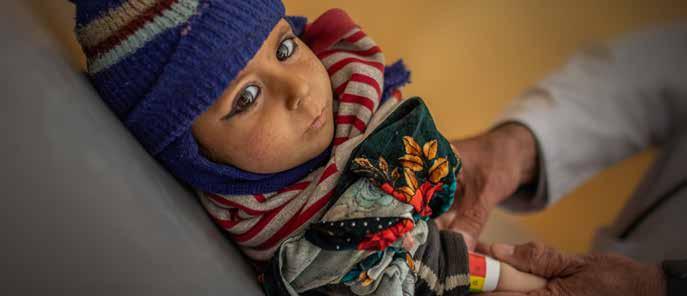
The DEC appeal raised a total of £51.8 million from the UK public and other donors to support Afghanistan’s people since it was launched in December 2021. Of this, £39.1 million was raised by the DEC directly, including £10 million in UK Aid Match funding, and £12.7 million by member charities.
Appeal funds have been allocated to 13 member charities who were ready to respond immediately. During the first phase of the response (15 December 2021 to 30 June 2022), DEC member charities and their partners have provided assistance to more than 240,000 people with £13.1 million from DEC funds. All remaining DEC funds will be spent during the second phase of the response, from July 2022 to December 2023.
Financial Summary
This assistance has provided more than a lifeline – it has provided hope.
Marzia, a widowed mother, says:
“After receiving aid, we experienced extraordinary changes to our daily life. As a mother, I no longer had to worry about how to feed my children.”
Aina, a young mother, says: “The help from the cash assistance is doing an amazing job at helping families like mine in the community to provide a better life for their children and themselves.”
Gulam Mohammad, an 84-year-old father and grandfather, says:
“The assistance provided was the very first help I received in my whole life. It had a good effect on my family living conditions.”

Image: Daykundi province where DEC member charities are providing emergency relief to vulnerable families. © Arete/DEC All figures are from December 2021 to October 2022.
a DEC charity. © Kellie Ryan/International Rescue Committee UK
£13,072,242 £13,555,476 Phase 1 confirmed budget Phase 1 6 month expenditure Total funds allocated90% Phase 1 expenditure39% £12,763,360 Member charities retained income £39,073,650 DEC Direct Donors* 75% 25% £51.8 MILLION RAISED *inc. £10m UK Aid Match funding As of 11/10/22 DEC costs Funds to be allocated 05 04 £51.8m raised
through UK
Match funding A total of
for the emergency response, including £10 million from the UK government
Aid
KEY ACHIEVEMENTS in the first six months of the Afghanistan Crisis Appeal 5,300 households received essential household items like cooking equipment, blankets and warm clothes, or cash grants to buy these items 390,000 people benefited from hygiene advice and support 179,000 people accessed health services including consultations, medicines, vaccines, and treatment for maternal and newborn care 22,800 households received hygiene kits including soap, toothpaste, and sanitary and personal hygiene items 313,000 women, children, and vulnerable people benefited from information on protection from gender-based violence 2,900 babies, infants, and mothers treated for acute malnutrition, with thousands more screened for malnutrition and provided with nutrition advice and support HOW WE HELPED HOW WE HELPED 243,000 people supported with cash to meet their immediate needs like buying food and medicine Habib* is screened for malnutrition at a health clinic supported by
130,000
DEC member charities are supporting the most vulnerable families to meet their urgent needs.
In the first six months of the response, the majority of DEC funds have been used to:
■ provide cash to families which they can decide how to spend to meet their immediate needs, such as buying food or medicine
■ supply families with packages of essential food such as flour, vegetable oil, pulses, beans, and rice, and with household kits containing cooking equipment and fuel for cooking
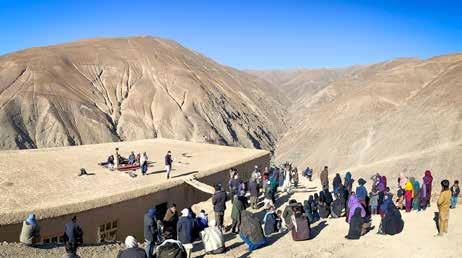
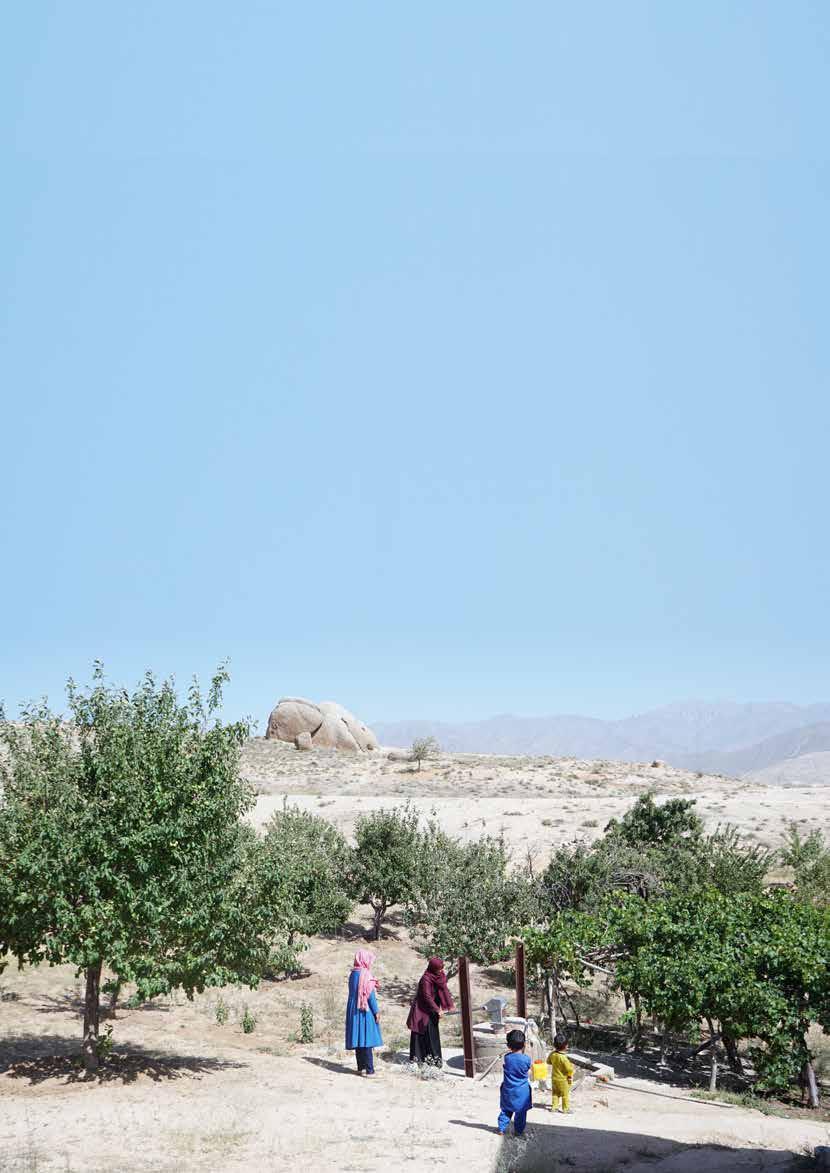
■ support families to stay warm during the harsh winter months by providing warm clothes and cash to buy blankets and heating supplies
■ improve access to health services by setting up mobile health units and providing mother and child healthcare (including through nutrition screening and treatment) and mental health and psychosocial support
■ provide families with improved access to safe water and with hygiene support, including through hygiene awareness training and hygiene kits containing soap, detergent, and sanitary items.
In the next phase of the response, from July 2022 to December 2023, DEC member charities will continue to support people to meet their immediate needs, while focusing on building people’s resilience through health, hygiene, and livelihoods support.
Phase 1 expenditure by sector
HOW WE HELPED: MULTIPURPOSE CASH ASSISTANCE
Providing cash assistance enables families to decide for themselves how best to meet their own needs. Most people used the majority of the cash they received to buy food but many also used some of the money to pay rent, buy warm clothes, pay for healthcare, medicines, or hygiene supplies such as soap, or meet education costs for their children. Feedback indicated that people appreciated the flexibility and choice that cash assistance provides. Aina, who received cash support through the local partner of a DEC member charity, said:
“The cash distribution programme has been a lifeline for me and my family. Cash is good because every family has their own problems which are not alike. For example, there are families who already have food supplies, but they need cash to buy other things – like visiting a doctor or paying for transport.”
Rather than creating dependency, cash support builds resilience by enabling families not only to choose what to spend the money on, but also to plan ahead for how and when to spend it. Post-distribution monitoring showed that cash is a popular form of support, with the vast majority of recipients reporting that it enabled them to meet their needs and that they preferred it to receiving assistance in kind.
Cash assistance is also particularly helpful for the most vulnerable people, such as people with disabilities and older people, whose needs are not always met by traditional aid packages. Cash support gives them the flexibility to pay for the specific items that they need such as suitable foods, medicines, and fuel for heating.
Because providing cash assistance avoids having to procure, store, and transport supplies, it is a fast and effective way of getting help to people in urgent need. However, the situation in Afghanistan presented several challenges – such as shortages of bank notes due to inflation and the collapse of the country’s banking system, and security risks in the transportation and distribution of cash (both for programme staff and recipients travelling to and from distribution points). DEC member charities took a flexible and adaptive approach, using a combination of physical bank notes, mobile money and vouchers, depending on the context, and partnering with financial service providers such as banks, remittance agencies, and mobile network operators.
In total, £5.9 million was spent on cash and voucher assistance in the first six months of the response (46% of total expenditure).
Hesamuddin’s family were in a desperate situation before they received cash assistance from a DEC member charity. He said:
“One night, when we had nothing at home, there were only a few potatoes and we had no oil. My wife boiled the potatoes and gave them to the children to eat. Since there were only a few, my wife and I did not eat.”
“By receiving this assistance, most of our problems were solved for the next few months. We bought food. I used the money for medical treatment for myself, my wife and mother. I bought clothes, bags, and notebooks for my children. I paid the electricity bill and I paid five of my debts.”
Cash assistance is giving older people and those with disabilities, like 65-year-old Hesamuddin, the flexibility to meet their needs, thanks to funds from the DEC Afghanistan Crisis Appeal.
© Mirwais Amir Akbar/Age International
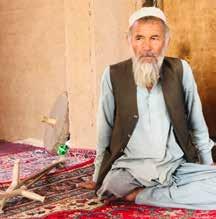
07 06
48% Multi-purpose cash assistance 26% Food assistance 9% Health 9% Shelter 5% Water, sanitation & hygiene 2% Nutrition 1% Other HOW WE HELPED
Left: Cash assistance is provided to vulnerable families in Afghanistan by the local partner of a DEC member charity.
© Cafod
© Arete/DEC
Aina*, a 30 year-old mother and beneficiary of a cash distribution programme, pumps water while her children play around her in Daykundi province.
HOW WE HELPED: FOOD
In December 2021, when the DEC launched its Afghanistan Crisis Appeal, the people of Afghanistan were facing an acute hunger crisis.2 Nearly 23 million people – more than half the population – were unable to get enough food. Of these, nearly 9 million people were facing emergency-level food insecurity3 – meaning they face very high levels of acute malnutrition or can only feed themselves by selling assets such as agricultural tools, animals, or household items, or resorting to emergency livelihood strategies such as child labour, forced marriage, or unsafe migration.

Getting food to people was therefore an urgent priority for DEC member charities. As well as providing cash assistance to buy food, member charities provided emergency packages of two days’ worth of ready-to-eat food, and household food packages containing bulk amounts of flour, vegetable oil, pulses, beans, rice, salt, and sugar – enough to feed a family of seven people for a month.
Food assistance does not just protect families from going hungry – it can also unlock other benefits. Marzia, a female head of household, explained how her family’s only source of income was her son Mohammed’s snack cart. He earned only a couple of dollars a day – not nearly enough to feed all the family. One by one, the children dropped out of school as they could not afford to eat, let alone buy school supplies. However, when the family received food packages from a DEC member charity, Mohammed was able to use some of his earnings to pay for school bags and books – meaning Marzia’s other children could return to school.
Ali Hassan’s family received food packages from a DEC member charity. He said:
HOW WE HELPED: HEALTH
Many people in Afghanistan have extremely limited access to health services – particularly those living in remote areas and those who cannot afford to pay for treatment. DEC funds were used to set up mobile health units targeting communities where there were previously no health services and where people are unable to travel long distances to access healthcare. The units were staffed and equipped to provide primary healthcare, maternal neonatal and reproductive healthcare, nutrition, and mental health services.
More than 60,000 individuals received a health consultation, including:
■ more than 17,000 children under five received integrated management of neonatal and childhood illnesses including diagnosis and treatment of acute respiratory infection, diarrhoea, and malaria
■ more than 2,000 women and children received a tetanus, measles, or 5-in-1 pentavalent vaccine
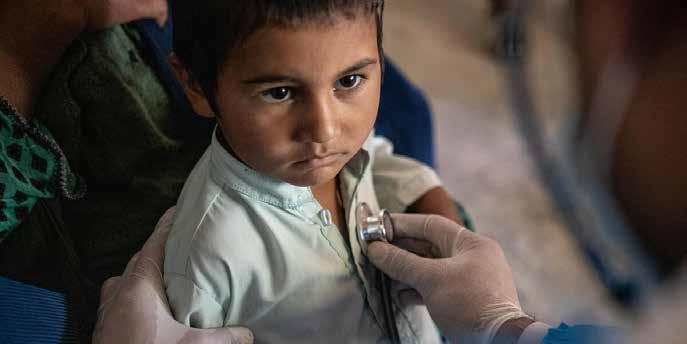
■ nearly 2,500 pregnant women received an antenatal care visit
■ nearly 22,000 children under five and nearly 4,000 pregnant or breastfeeding women received nutrition screening
■ more than 1,500 children and nearly 900 women received treatment for acute malnutrition
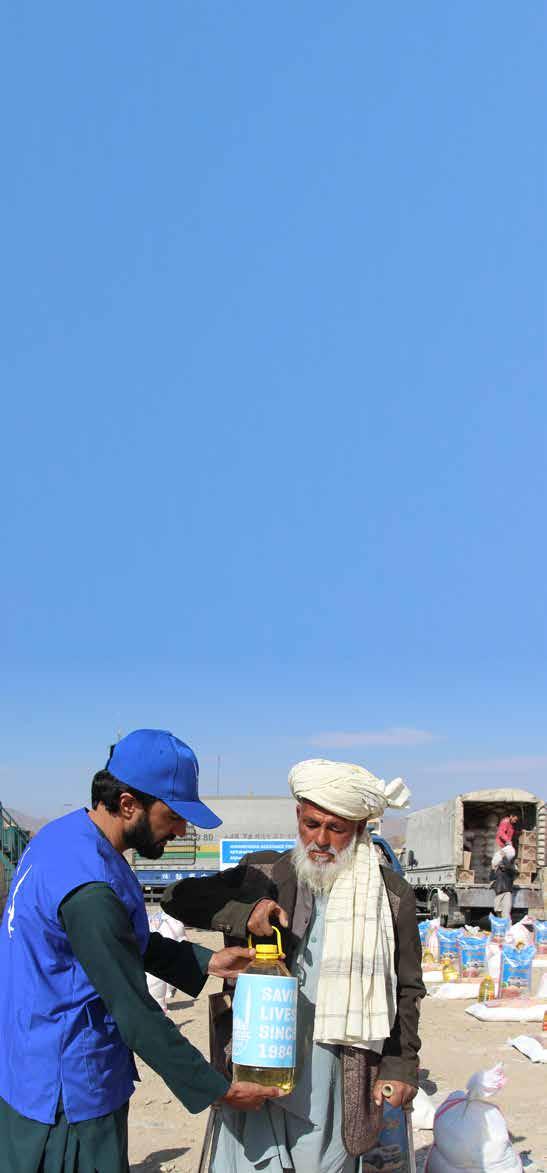
■ more than 2,500 children and nearly 1,200 women received vitamin supplements.
“
I can’t provide food three times a day. Sometimes the children just get to eat half a meal, because there is no work. Out of desperation, had the assistance not arrived, I would have had no choice but to sell my daughter or son, in order to save the rest of them.”
“We benefited for three months from this assistance. We managed to cook and survive. For the future, my concern is to find something [work] so we can eat and survive.”
One DEC member charity established eight integrated mobile health and nutrition teams in Nangarhar, Kunar, and Laghman provinces targeting internally displaced people, conflict-affected people, and under-served host communities. Each mobile unit visited five specified locations once a week. Both female and male staff were recruited to ensure that women and girls were able to use the services. Each unit was staffed by two physicians (one male and one female), a midwife (female), a nutrition nurse (either male or female), a psychosocial support officer (female), a vaccinator (female), and health and nutrition promoters (one male and two female). Staff training needs were assessed and appropriate training was provided. Each unit was equipped with medical and non-medical equipment, pharmaceuticals and medical consumables, and nutritional treatments and supplements. Delivery was coordinated with national and provincial health authorities to facilitate referrals for further treatment if needed, and with community leaders to ensure vulnerable people were aware of and could access the services.
Sameem* aged three, is treated for pneumonia at a clinic run by a DEC member. His mother struggles to access enough food to feed her children, and lost her two-year-old son the previous year as she could not afford transport or treatment at a hospital.
© Sacha Myers/Save the Children
In addition, community-based awareness-raising sessions on health and nutrition were held. An independent real-time review of the DEC response conducted in March/April 2022 found that, while most affected communities still do not have access to a diverse diet and often cannot afford to purchase key items, the nutrition counselling activities and information about infant and young child feeding practices have had positive outcomes on children’s health.
Mental health services are particularly scarce across Afghanistan, with most people unable to access the care they need, or reluctant to seek it. The mobile health units provided psychosocial support through individual sessions, group sessions, and community engagement. One DEC member charity provided a psychosocial support hotline to enable those who are geographically isolated, or are otherwise unable or reluctant to seek help, to access psychosocial support.
08
HOW WE HELPED
2 https://www.wfp.org/emergencies/afghanistan-emergency
IPC, Understanding the IPC Scales, June 2022, p4
3
Islamic Relief
Left: Distribution of food packs to 315 families in the Khak-e-Jabbar district of Kabul province. ©
Father of 11, Ali Hassan* from Mazar-i-Sharif was struggling to feed his family before the assistance arrived.
09
© Arete/DEC
HOW WE HELPED: SHELTER HOW WE HELPED: WATER, SANITATION, AND HYGIENE
The loss of income and livelihoods caused by the country’s economic collapse came at the worst possible time, leaving already vulnerable households –particularly those including people with disabilities, older people, and femaleheaded households – unable to prepare for the harsh winter. DEC member charities distributed kits containing winter clothes such as jumpers, hats, socks, and shoes; blankets and wraps; and stoves, fuel, and kitchen items for cooking hot food. Assistance was also provided through cash grants, enabling families to choose the best way to spend the money to meet their priority needs. As well as spending a portion of the cash on winter fuel and warm clothes, families were able to access healthcare and purchase education materials such as stationery and books for their children. A real-time review of the DEC emergency response, conducted in March/April 2022, noted:
“Cash distribution for shelter is seen as the most valuable support and is preferred to in-kind support. Distributed cash was reportedly very timely, especially for those who received it during Ramadan and winter months, as it enabled families to survive. Marginalised groups, such as persons with disabilities and widowed women, were prioritised.”
64-year-old Bibi Gul is unable to walk or work due to her disability. She feared she would be evicted from her home, but cash assistance from a DEC member charity arrived just in time. She said:
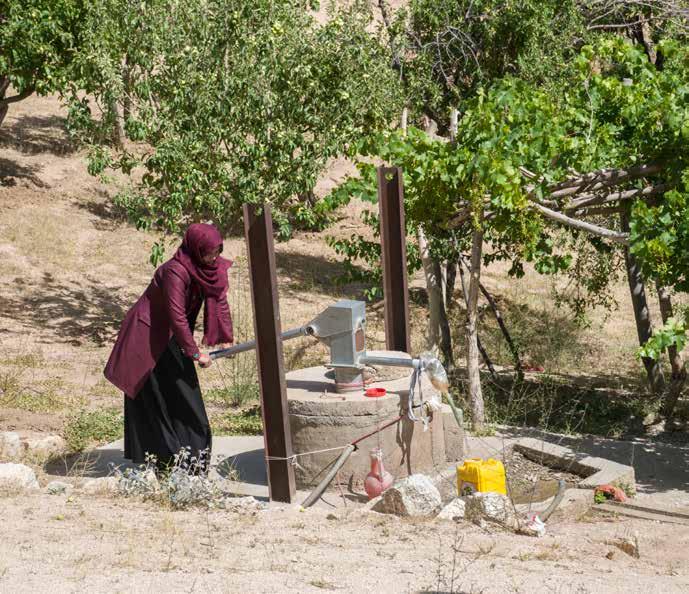
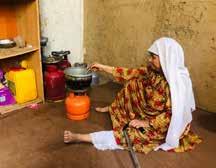
“We are very happy that many of our problems are resolved for a few months. We paid the rent for our house. We paid our water and electricity bill. We could pay our debts. And we have stored food and fuel for a few months.”
“If I had not received this assistance, I would not have been able to do this. The house owner would have evicted us because we could not pay the rent. If you had not supported us, maybe we would be homeless or without electricity and water.”
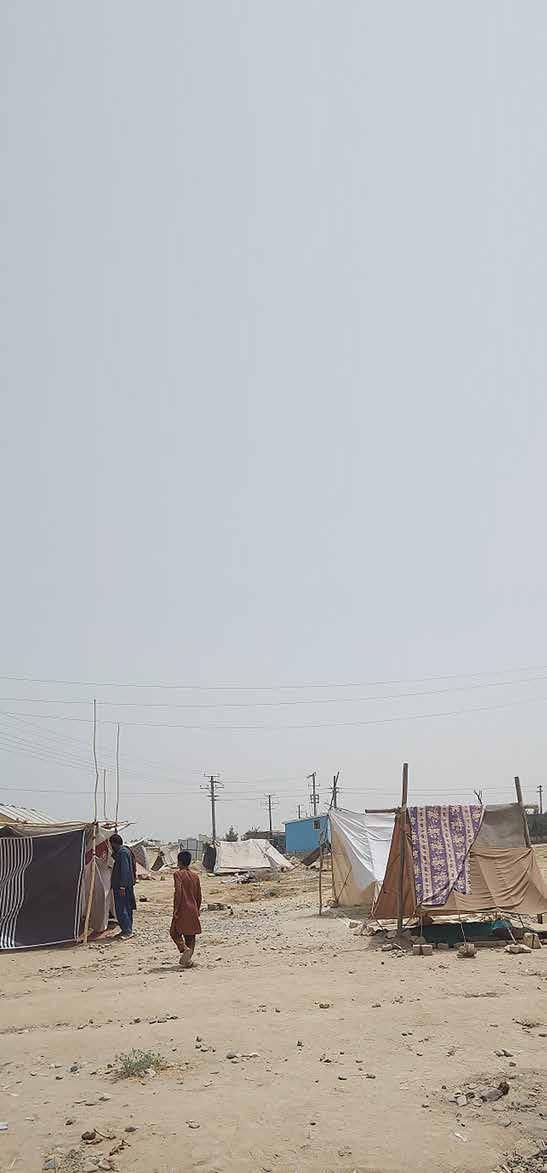
Access to clean water is essential to the survival and health of people of all ages, but particularly children and vulnerable people. DEC member charities have been rehabilitating water points in rural locations where access to safe water is limited. One DEC member constructed and rehabilitated four wells and installed solar panels to provide power to the water systems, which are designed to be durable and low-maintenance. DEC members have also supported the establishment or revitalisation of water and sanitation user committees to manage and maintain water points after the end of the project.
To help families protect themselves from diarrhoea and other hygiene-related infections, households have been provided with hygiene kits containing soap, detergent, toothbrushes and toothpaste, towels, sanitary pads, and a plastic jerry can to collect water. Families and communities
have also received information on good hygiene practices (including on Covid-19 prevention) through community meetings, awareness-raising materials, and local radio. One DEC member piloted a new approach called Wash’Em, which is designed specifically for use in emergency responses and focuses on changing behaviour and attitudes at household and community level. The approach has a strong focus on addressing the barriers to good hygiene and reinforcing the motivators. The DEC member charity provided training and ongoing support to partner staff, who delivered sessions to communities and will continue to use the approach in future. Assessments showed that 91% of the people who participated in the hygiene promotion sessions shared their knowledge with family and friends, and 93% of participants stated that they found the sessions helpful to improve family and community health.
11
HOW WE HELPED
© Arete/DEC 10
Aina*, a 30 year-old mother from Daykundi province, collects water from a well near her home.
Bibi Gul is more secure in her home thanks to the cash support she received.
Temporary shelters erected by displaced families who fled their homes due to conflict.. © Save The Children
© Mirwais Amir Akbar/Age International
HOW WE HELPED: PROTECTION HOW WE HELPED: LIVELIHOODS
Before delivering assistance to affected communities, DEC member charities assessed and adapted to any protection risks – for example, by ensuring distributions were carried out in safe locations, with safe places to wait for vulnerable people including people with disabilities, older people, and pregnant and breastfeeding women. They also consulted with community leaders about distributions to avoid contributing to potential community conflict, and divided recipients into small groups to avoid attracting attention at distribution sites. Women were supported to travel to sites, for example by providing transport not just for a mother and children to attend a health programme, but also for a mahram (male relative, without whom women cannot move around in certain areas). During distributions, participants were informed about feedback and complaints mechanisms, and debriefs were held with staff after each distribution to discuss the safety, timeliness, and accessibility of the distribution, and how these factors might contribute to increasing or decreasing protection risks.
Member charities also held community awareness-raising sessions on gender-based violence and set up safe spaces for women, girls, and families. These are places where people can relax, take part in learning activities, and access advice and psychosocial support. Pari, a 13-year-old girl, who participated in a DEC member charity’s psychosocial support (PSS) programme, said:
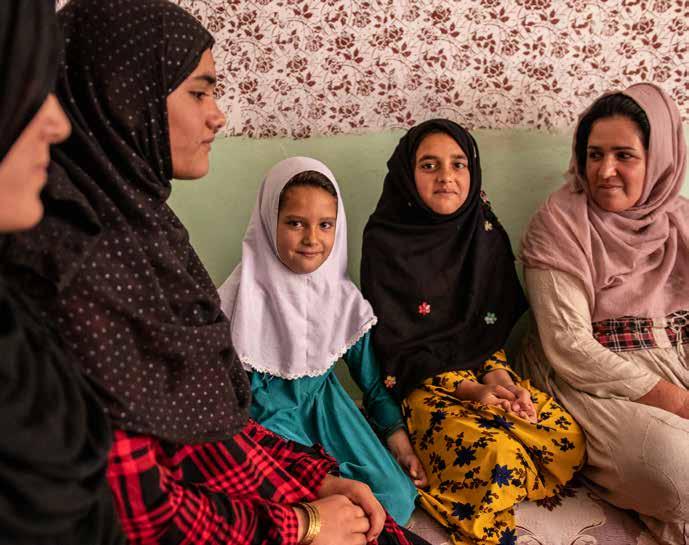
Small-scale agriculture is a major source of both food and income for Afghanistan’s rural population. Supporting people to rebuild agricultural livelihoods is therefore a crucial part of a long-term response to the combined crises of hunger and economic collapse.

The same DEC charity also provides individual protection support to vulnerable women, for example by providing medical vouchers or paying for legal documents.
Cash-for-work programmes – which provide immediate support by creating temporary jobs on projects that benefit the community – were set up by one DEC member charity to clean and rehabilitate irrigation canals. This had been identified as a priority by community members during the project planning stage. Training in climate-smart agricultural techniques and livestock production was also provided to 600 farmers across Badghis and Helmand provinces. Participants were identified from communities that were worst affected by the 2021 drought. The training was delivered by local female and male trainers and 50% of participants were female. Community members – 50% of them women – also received cash assistance to purchase agricultural and livestock inputs. For female-headed households in particular, livestock-rearing – such as raising milk-producing cows – provides a valuable source of income.
This livelihoods assistance is designed to provide immediate benefits – through cash-for-work and cash assistance – while promoting longer-term food security by improving technical skills and building resilience. In addition, 10 community-based disaster risk management committees were established – four of them exclusively female. Training was provided to committee members on disaster risk reduction, environmental protection, and responding to the impacts of climate change. These committees will be able to support their communities to prepare for and respond to future disasters such as droughts and floods.
60-year-old carpet-weaver Saaman* from Herat has been the sole provider for her family since her husband was killed. She does everything she can to earn an income including washing people’s clothes.
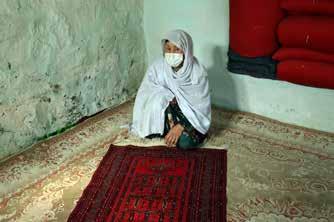
© Osman Khayyam/DEC
© Arete/DEC
13 12
“My parents allow me to come to the PSS centre as a safe place for girls which gives me the opportunity to interact and recover from loneliness.”
HOW WE HELPED
Main image: Maher*, a 49-year-old father of seven, in his village in Daykundi province, where drought has affected the almond trees.
44-year-old Amera* (right) with four of her eight children. The family came to Kabul last year, shortly before the death of Amera’s husband from heart disease, and were supported by a DEC member charity.
© Sacha Myers/Save the Children
CHALLENGES
Transferring funds
The breakdown of the formal banking system – due to a combination of international sanctions and economic collapse – means member charities have had to find alternative ways to get funds into the country. After undertaking enhanced due diligence, all member charities have been able to make alternative arrangements with non-banking financial institutions. These include payment providers using hawala, an informal money transfer system that is well-established in Afghanistan. While there were some initial delays in transferring project funds, for example to purchase relief supplies, many member charities were able to draw on prepositioned emergency stocks and on established relationships with local suppliers in order to ensure timely delivery of assistance packages.
The dysfunctional banking system, in combination with price rises and a widespread loss of jobs and livelihoods, has also led to a shortage of money in circulation. In some instances, where insufficient cash was available locally, money had to be transported from Kabul to project regions, in order to be distributed as cash assistance for people to buy food and other essential items.
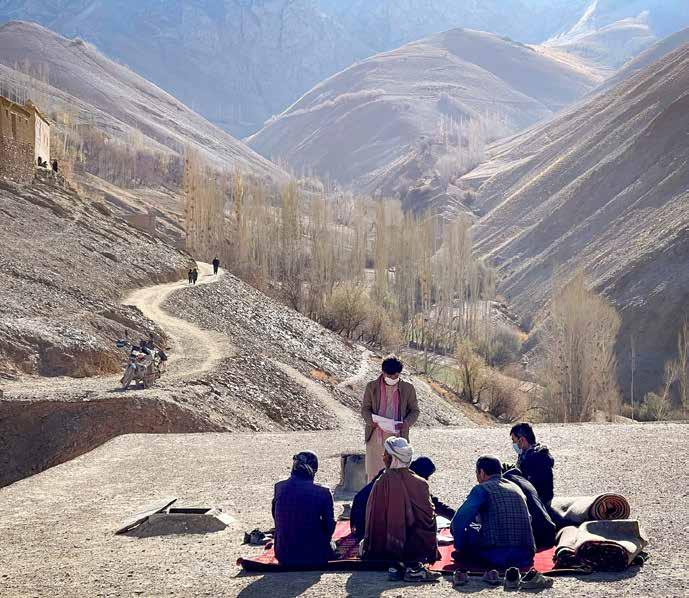
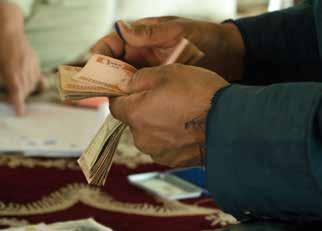
Involving women
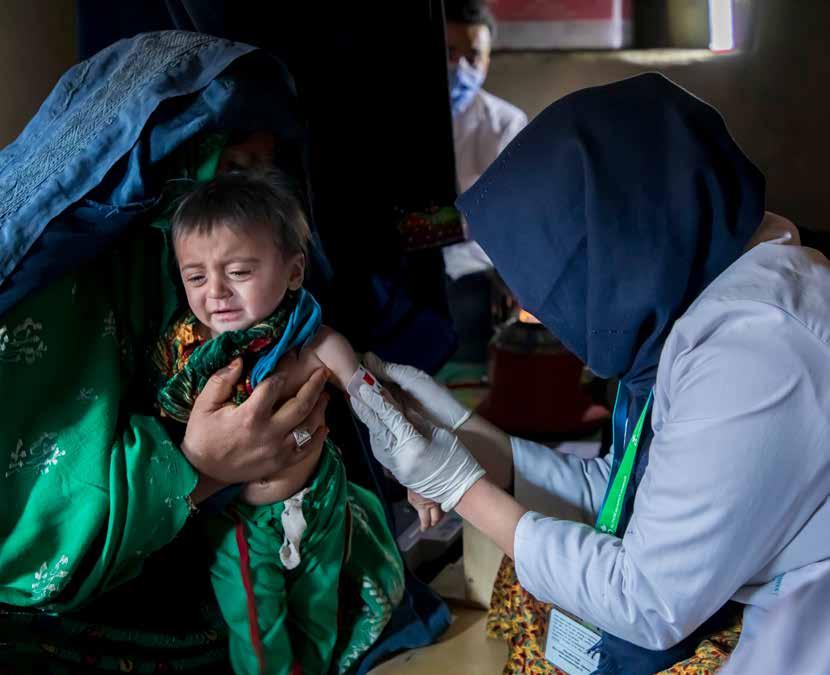
The meaningful participation of women in the emergency response is a continuing challenge. While some member charities received verbal agreement to include female staff in their programming, the authorities’ policies are unclear and inconsistent, and member charities have often needed to negotiate access for female workers with authorities at various levels. In some areas, women are forbidden from travelling in the same car as men, which has hampered some programme activities. One member charity responded by hiring local women in a pair with a male relative in order to ensure the participation of women in delivering the emergency response.
The participation of female staff plays an important role in ensuring that assistance reaches vulnerable women
and girls in need. Culturally, men are consulted more than women and they are the ones who receive and collect humanitarian assistance. In some areas, women are excluded from community-level decision-making, or allowed to participate only in short meetings but not more extensive consultations. DEC member charities addressed this by providing separate meetings for women and girls, and safe spaces for families where women and girls can access services such as mental health and psychosocial support. Members also used the ‘couples’ approach – involving pairs of brothers and sisters – in community-level facilitation, to enable communication and data collection with women and girls, and ensure household surveys could be conducted by female staff.
14
CHALLENGES
Preparing for a cash distribution in a rural area of Afghanistan.
© Cafod
© Arete/Action
15 ©
Nazari/DEC
A healthcare worker assess a child for malnutrition at a mobile health clinic provided by a DEC member charity in Daykundi province.
Against Hunger
Reza
Working with authorities
Obtaining permissions from the authorities is a complex and lengthy process as there are several layers of administration and governing bodies from whom authorisation must be sought, as well as religious and community leaders.
Member charities have had to dedicate significant time to coordination with authorities across different regions, and these negotiations have on some occasions led to delays in programme delivery. Some member charities have reported attempts by authorities to directly interfere in aid delivery, for instance by insisting on payment for government monitoring staff, demanding to see beneficiary lists and other personal data, and trying to direct aid to people affiliated with the authorities.
Member charities have in all cases resisted interference, emphasising the core humanitarian standards and principles and the importance of independent and impartial delivery of aid, and referring to agreements negotiated between the UN Office for the Coordination of Humanitarian Affairs (UNOCHA), the Agency Coordinating Body for Afghan Relief and Development (ACBAR), and the authorities at national and regional levels. Because of their longstanding involvement with the region, member charities also have strong relationships with communities, including with religious leaders and community elders, which helps to ensure that aid reaches the intended recipients.
Reaching people in remote communities
Member charities faced challenges in reaching some of the more remote communities due to poor infrastructure in the mountainous terrain, and harsh weather conditions including heavy snowfall throughout the winter. Nevertheless, when a 5.9 magnitude earthquake struck south-eastern Afghanistan on 22 June 2022, member charities reacted quickly to deliver food and cash assistance to households in Paktika province.
People in Afghanistan are often unable to access services such as healthcare due to lack of transport or long distances to the nearest health centre. Member charities sought to address this issue through the provision of mobile health clinics, or by providing transport – for example, for women (and a male family member as an escort) so that women can attend maternal and child health clinics.
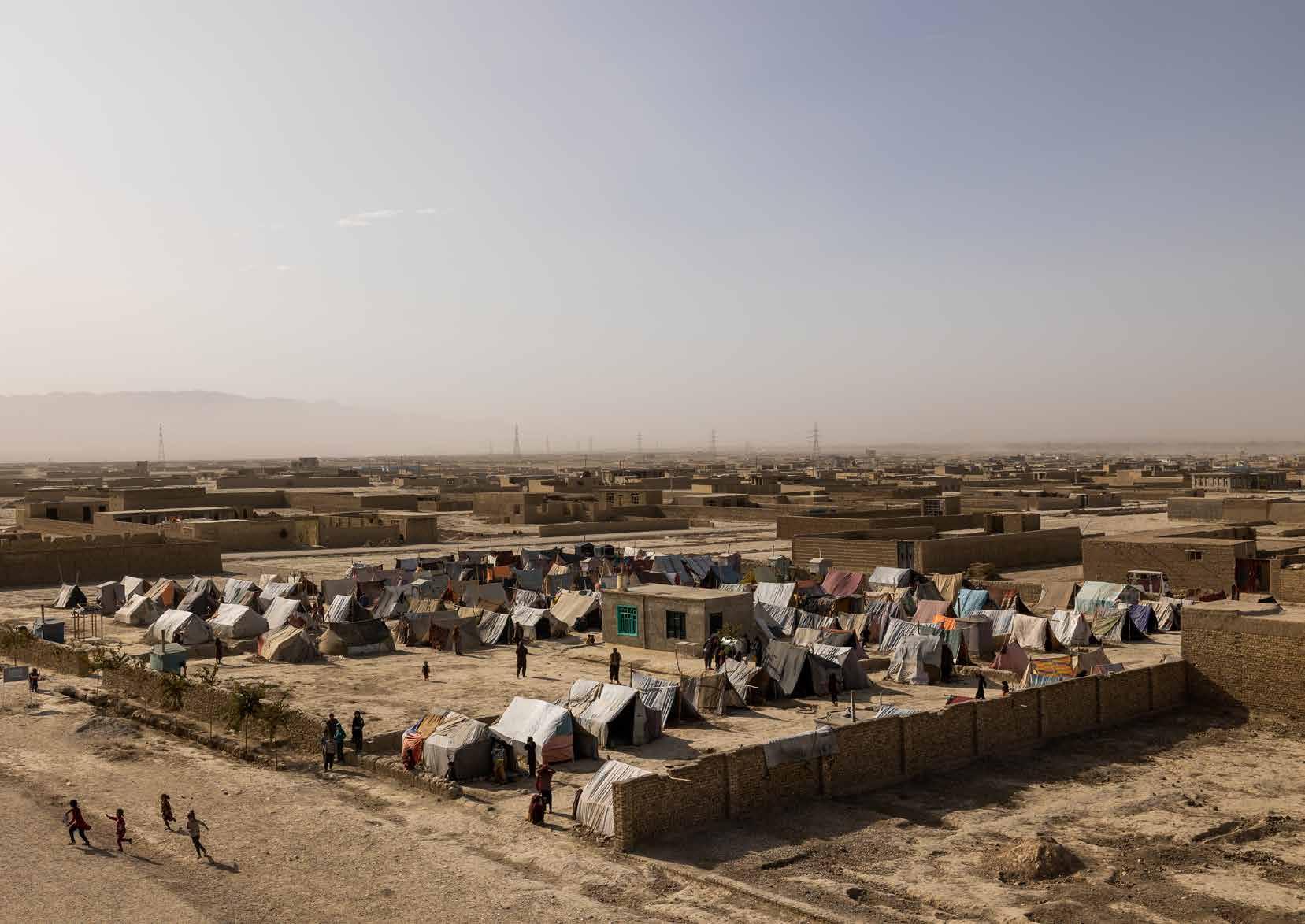
17 16
CHALLENGES
© Save The Children
Main image: A settlement for displaced people in northern Afghanistan.
IMPROVING HUMANITARIAN PROGRAMME DELIVERY
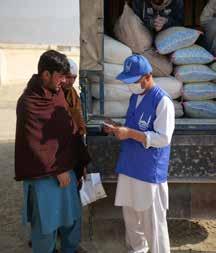
Supporting the most vulnerable people
DEC members ensured that the most vulnerable and marginalised groups –the people and families most in need of humanitarian assistance, and yet at the same time typically the least visible and most overlooked groups – were identified and supported. This includes women, children, older people, people with disabilities, and internally displaced families. Efforts were made to identify households headed by women (including widows or single mothers with young children) or by older people (particularly those with responsibility for children), and households with people with a disability. DEC member charities consulted with local communities to identify people in need, working within shura (local council) structures to develop criteria for selecting recipients; holding community meetings; and conducting door-to-door needs assessments through interviews and direct observation of the living situation of households.
At all times, DEC members worked within local sensitivities and constraints. Female staff liaised with vulnerable female-headed households and delivered separate activities for women and girls – for example, working with local women’s representatives on hygiene promotion and Covid-19 awareness-raising activities. Training was provided to project staff on the rights and needs of people with disabilities, on how to identify caregivers with disabilities, and how to address barriers that prevent people with disabilities from participating. Taking account of low levels of literacy, staff allowed time to explain information verbally to community members, with particular attention to women and girls who are less likely to have completed an education or to be in school.
Kaamla* and her family were displaced. Her son now attends a community-based school run by a DEC member charity.
© Kristiana Marton/Save the Children
Being accountable to communities
DEC member charities and their partners work directly with local communities and are committed to consulting regularly with them to ensure that the emergency response is meeting their needs.
From the outset, meetings were set up with community members – including women, children, people with disabilities, and older people, as well as religious and community leaders – to explain the project objectives, the types of assistance that would be offered, and the criteria for selecting people to receive assistance.
Beneficiary selection committees were established in each of the targeted locations consisting of representatives of vulnerable groups as well as local community leaders. Some member charities set up separate male and female committees to ensure that vulnerable women and girls – and in particular, female-headed households – were not overlooked for assistance. The committee members were present throughout the entire beneficiary selection process and the distribution of food and cash assistance to the selected households. Project staff maintained close relationships with the committee members, often through regular monthly meetings, and ensured they were updated regarding project plans.
Some member charities recruited outreach promoters, both female and male, from within the project area to engage and inform community members. During field visits and through more formal post-distribution monitoring, staff checked that project participants had received the goods or services they were promised and that they were happy with this form of support. Feedback was then used to inform the next stage of project planning.

© Ali Gilani/Islamic Relief
Gul* is 62 and, confined to a wheelchair, unable to work. He lives with his wife and five children, and received a cash grant from a DEC member charity.
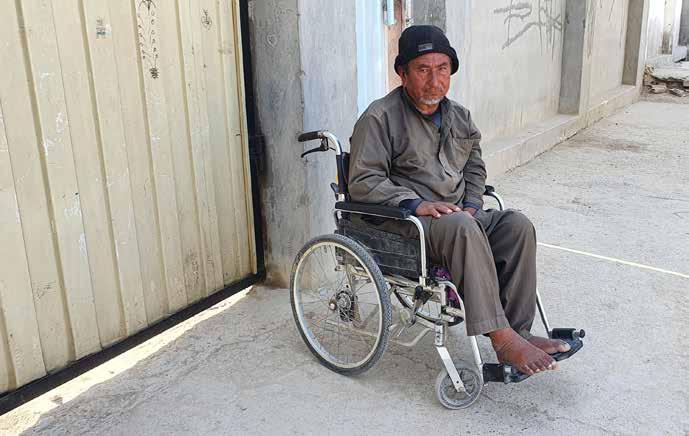
© Action Against Hunger
Members used a variety of channels to encourage feedback including hotline numbers, email, face to face, and through community leaders. In particular, efforts were made to ensure feedback mechanisms were accessible to people with disabilities and people who are unable to read or write – for example, through phone and in-person interviews – and were sensitive to local and cultural expectations, for example by providing training for trusted elders and community members on how to report cases of abuse or misconduct.
Learning from feedback and post-distribution monitoring on what worked well and what could be improved was shared with communities through formal and informal meetings and discussions. Learning is also captured in communication materials like posters, banners, and leaflets designed in formats suitable to the local context, taking into account literacy levels and the preferences of community members themselves.
In addition to their own complaints and feedback systems, DEC member charities provided community members with information about the Awaaz Afghanistan toll-free number. Awaaz is a free, confidential hotline established and operated by the United Nations through which people can access information and register complaints and feedback on the humanitarian response. The Awaaz number was displayed during DEC member charity distributions, and cards with details and the contact number were provided during assessments and meetings with community members. Complaints and feedback are monitored by the United Nations Office for Project Services (UNOPS) which refers issues to the organisations concerned, and follows up to ensure appropriate action has been taken.
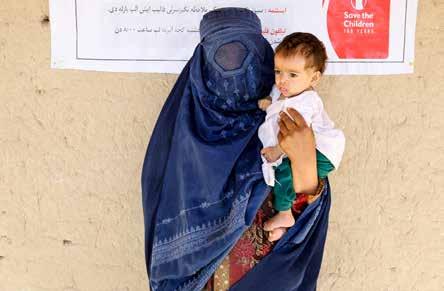
A mother and baby visiting a health clinic.
© Michal Przedlacki/Save the Children
IMPROVING DELIVERY
A DEC member charity distributes food packs and hygiene products in two villages located on the outskirts of Kabul.
18 19
Safeguarding
DEC member charities have robust safeguarding policies, procedures, and mechanisms in place to protect the people with whom they work. These outline unacceptable behaviour and the actions that will be taken to investigate allegations, support victims, and discipline perpetrators, including referring them to the relevant authorities. Member charities carried out safeguarding risk assessments with partner and project staff, and provided training on safeguarding and PSEA (protection from sexual exploitation and abuse) for local staff, volunteers, and sometimes for members of affected communities. From the outset, member charities continuously engaged with communities, consulting with community representatives (including women, older people, and people with disabilities) on the most appropriate channels for feedback and complaints. They ensured community members were aware of the expected standards of behaviour of staff and volunteers, knew how to report concerns, and understood that any complaints would be treated in confidence, investigated, and reported back on.
Supporting a locally-led response
Wherever possible, DEC member charities implemented projects through existing community and local authority structures, from village committees to government departments such as the Ministry of Rural Rehabilitation. This approach builds trust within communities and local authorities, improving the effectiveness of the emergency response by embedding it within local structures. It also helps to build skills among local people and equip them to respond to future crisis situations themselves. For example, water management committees were trained to operate and maintain water facilities, and essential community services such as mental health and psychosocial counselling are now provided by medical staff trained with DEC funds. Women were also trained to deliver information on health and nutrition to other mothers and caregivers within their communities.
Hiring local people as staff and involving them as volunteers also helps to improve acceptance and sustainability of activities. One member charity engaged both male and female casual workers from the community to support distributions. The involvement of local people helped the distribution to run smoothly while providing participants with an income and the opportunity to gain valuable skills and experience.
Investment in local organisations is critical to ensure the timely delivery of humanitarian services. Nine local partner organisations were involved in delivering Phase 1 of the response (December 2021 to June 2022), accounting for 24% of DEC funds spent. DEC member charities provided training and support to local partners who were new to humanitarian work. One member charity helped its local partner to digitise its manual systems to improve information transfer and operational delivery, and to strengthen its supply chain management, focusing particularly on warehouse management.
Adaptive programming
The DEC provides a flexible source of funds so that member charities can adapt to changing situations or new needs. In the challenging operating environment in Afghanistan, sometimes project components had to be postponed, for example because of delays caused by the unavailability of cash for distributions in a particular area or severe winter weather with heavy rain and snow. Where possible, plans were changed to ensure assistance still reached people in need: for example, when one member charity experienced delays in sourcing items for winterisation kits, funds totalling almost £80,000 were repurposed to provide cash assistance to affected communities instead.
When an earthquake struck Badghis and Paktika provinces in June 2022, causing damage to homes and infrastructure including health facilities, schools, and water systems, DEC member charities stepped in to provide assistance to families who had been affected. 1,000 households
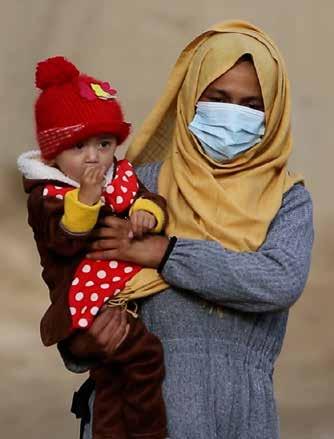
in Paktika received ready-to-eat food packages, with the DEC member charity able to use exchange rate gains and underspend from other budget lines to provide three distributions instead of the originally planned two distributions. Nearly 400 of the most badly affected households also received multipurpose cash assistance to support their recovery.
Another DEC member charity was a member of the Central Committee for Earthquake Response in Paktika Province set up by the Ministry of Economy. The member charity was able to move quickly to provide cash assistance to 1,000 affected households by transferring funds to the area through a hawala provider using a framework agreement that was already in place.
Leila* prepares dinner for her family over a fire on a hill in Badghis province. The family were displaced due to drought.
© Andrew Quilty/Action Against Hunger
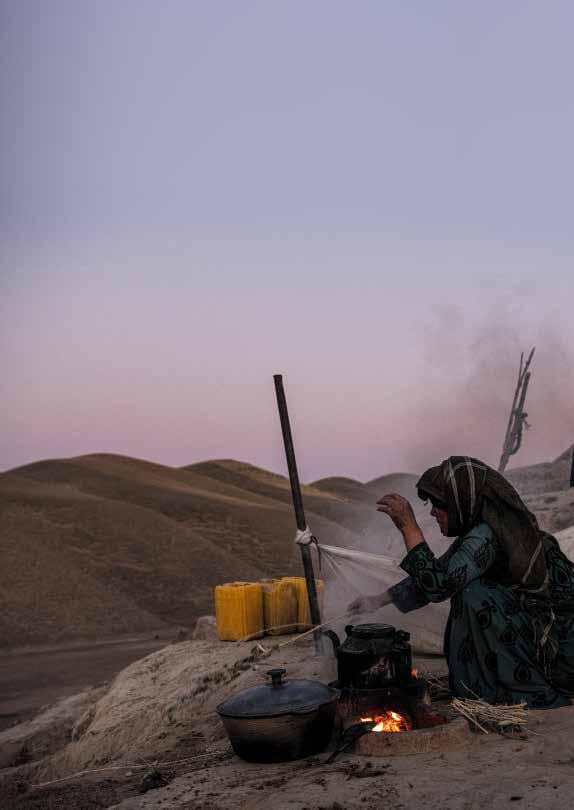
21 20
IMPROVING DELIVERY
Taban* takes her baby Nava* for a check-up at a health centre run by a DEC member charity in northern Afghanistan.
© Michal Przedlacki/Save the Children
Coordination
DEC member charities cooperated with each other and other humanitarian agencies to ensure that families with unmet needs were identified and assisted, and to avoid duplication of either people or areas targeted for assistance. This includes bi-monthly meetings where DEC member charities share experiences and update each other on planned activities.
Member charities also participate in cluster meetings – working groups of humanitarian organisations (UN, international, and local organisations) covering the main sectors of humanitarian action such as health, shelter, and WASH. Clusters are the main point of coordination for humanitarian organisations and have clear responsibilities for upholding technical and quality standards.
DEC member charities and their partners worked closely with national, provincial, and local authorities to ensure coordination. For example, one member charity held meetings with the Provincial Department of Economy, Afghanistan National Disaster Management Authority, Department of Public Health, and Department of Labour and Social Affairs, as well as with other humanitarian actors including UN agencies and national and international NGOs. These coordination meetings informed the DEC member’s decision to select areas that were not covered by existing humanitarian actors.
Member charities also coordinate with community groups such as community development committees, shuras, and community elders. This helps to achieve access to project locations, brings local knowledge and expertise into project planning, and ensures the involvement of people in the affected areas in the planning and delivery of humanitarian aid.
Families in need of support collect food and hygiene packs at a distribution near Kabul.
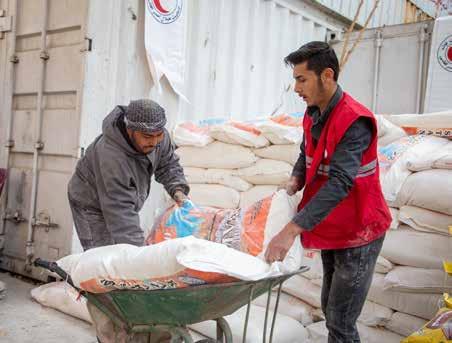
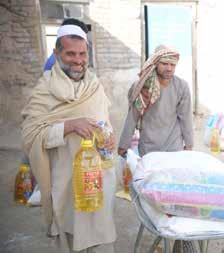
© Ali Gilani/Islamic Relief
Innovations in practice included the creation by one DEC member charity of the new post of Technical Support and Coordination Managers. These staff supported the member charity’s implementing partners in Daykundi, Samangan, and Takhar to ensure the quality and effectiveness of programme delivery. They also focused on building the capacity of the local partners. The member charity reported that this proved to be an effective and fruitful approach to sharing learning and improving programme quality.
Duty of care and remote management
Security concerns, which vary across the country and can change quickly, meant member charities often adopted a low profile in their areas of intervention, particularly when travelling. All member charities prioritised safety of project staff and reported that they had not experienced any direct attacks on organisational assets or staff. A DEC-funded review noted that member charities have been quick to react to security issues, providing training and continuous assessment of the risks, with support from the International NGO Safety Organisation and the UN Department of Safety and Security.
Throughout the response, DEC member charities have conducted regular situation monitoring to identify and react to risks. One member charity developed a comprehensive country-specific security management plan that includes staff safety, security briefings, vehicle movement safety, security checkpoints, communication methods, residential and office safety measures, risk avoidance measures, and regular risk assessment of operational areas and facilities. It also developed a Duty of Care policy specifically tailored for the Afghanistan programme that is shared with all staff members and available in English and the local languages Dari and Pashtu. During the planning stage, the same charity’s access team negotiated with the authorities on the participation of female staff in project delivery, and involved local community members in developing risk mitigation strategies to ensure the smooth running of distributions.
Member charities deployed technical support officers to project areas to work alongside project delivery staff – for example, one member appointed community development facilitators, who were based in target districts and were responsible for coordinating day-to-day activities and reporting back daily to the project officer and project manager.
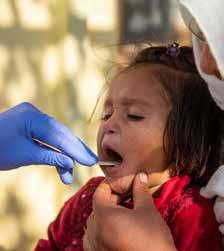
To prevent the spread of Covid-19, checklists of essential protection measures were kept, vehicles and equipment were regularly sanitised, and appropriate Covid-19 protocols were followed at all distribution sites.
A child is examined by a doctor during a community visit by a mobile health team.
© Meer Abdullah/Afghan Red Crescent
DEC member charities acknowledged the potential impact of the humanitarian crisis on the well-being of local staff, alongside the uncertainties and stresses caused by the economic turmoil and political upheaval of the preceding year. One member charity noted:
“We had to ensure we were considerate of their challenges and well-being and how this impacted them, even as they were working hard to support others. It was important to sometimes take time to listen to their own personal experiences before jumping into project matters.”

Another member charity set up a dedicated psychosocial staff care unit consisting of two mental health and psychosocial support workers based at each location, supported by a mobile psychologist covering all locations.
Left: A village located on the outskirts of Kabul.
© Ali Gilani/Islamic Relief
23
IMPROVING HUMANITARIAN PROGRAMME DELIVERY
IMPROVING DELIVERY
Staff from a DEC member charity’s local team deliver food supplies to families affected by multiple crises in Afghanistan.
© Afghan Red Crescent/Meer Abdullah
22
FUNDRAISING FOR THE AFGHANISTAN CRISIS APPEAL

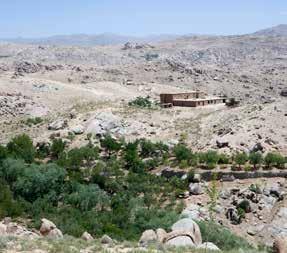
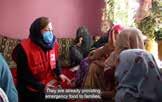
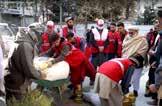
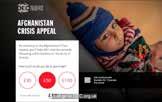
Protecting the environment
Where possible, efforts were made to minimise the environmental impact of the emergency response. Food and other items were sourced as locally as possible. Waste bins were installed at distribution points and people receiving packaged items such as nutrition treatment sachets were encouraged to return empty sachets after use. Member charities also reported positive responses from community awareness-raising sessions to promote environmental protection, which were often incorporated in hygiene promotion messaging. In addition, some components of DEC-funded projects, such as technical training and cash-for-work, have a direct impact on the efficient management of natural resources, such as training on climate-smart agriculture and the rehabilitation of irrigation systems.
However, a real-time review conducted in March-April 2022 found that environmental concerns were a low priority in the context of the rapidly-evolving crisis response, and that specific implementation and monitoring of environmental actions was lacking, with members tending to focus on supply-chain sustainability as set out in their global organisational environmental policies (for example, local procurement, use of solar panels, and coordination of travel to minimise car trips). Members are being encouraged to consider context-specific actions in the next phase of the Afghanistan emergency response and to incorporate environmental assessments as a regular part of the project management cycle.
Learning and improving
An independent real-time review was carried out in March-April 2022 to highlight good practices and identify potential areas for improvement. It found that the emergency response was grounded in the local context and used participatory processes to identify people’s priority needs. Despite many challenges in delivering project activities, the review found that member charities were effectively supporting people and communities and have been agile and adaptable in responding to changes in the operating environment. Recommendations include strengthening community engagement and feedback mechanisms to ensure people’s ongoing needs are being identified and met.
For Phase 2 of the response (July 2022 to December 2023), the DEC has commissioned a project focusing on accountability to affected populations. The project will engage local people and communities in the ownership of feedback processes to centre their voices and priorities in the DEC-funded emergency response. This will involve: community perception surveys; participatory action research using PhotoVoice; piloting of an inclusive data dashboard; and peer learning exchange workshops.
Towards the end of Phase 2, five members will commission independent evaluations of their DEC-funded work. In addition, once all programmes have come to a close, a desk review of learning across all members will be undertaken and the findings will be shared widely.
One member charity delivering water rehabilitation projects included environmental restoration requirements in contracts with suppliers, for example to ensure that any trees felled during construction were replaced by planting new trees which are necessary for replenishing underground water aquifers. The member charity also used solar energy to power water systems and designed gravity-fed water networks where possible, both of which help ensure the sustainability of watersystem improvements after project end.
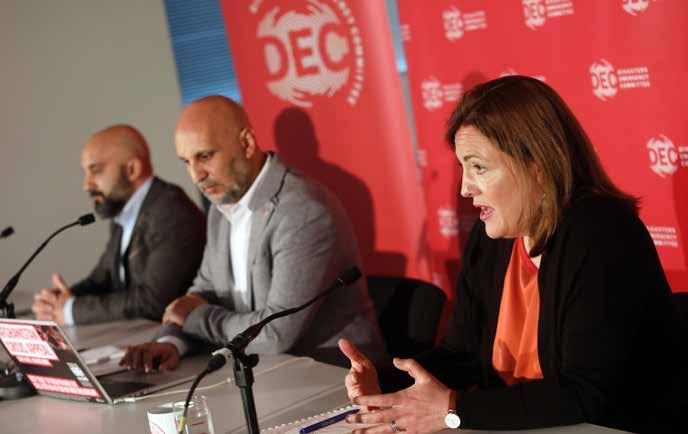
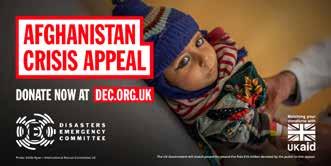
The DEC is thankful for the amazing generosity of both the UK public and corporate supporters towards the Afghanistan Crisis Appeal. Since the appeal was launched it has raised £51.8m. Of this, just over £12.7 million was raised by DEC member charities in their own direct appeals to their supporters using DEC co-branding. The remaining £39m was raised by the DEC, including £10 million matched by the UK government as part of the UK Aid Match programme.
Three months into the Afghanistan Crisis Appeal, in March 2022 the DEC launched the Ukraine Humanitarian Appeal. The DEC wishes to note our particular thanks to the variety of supporters who continued to give and fundraise for the Afghanistan Crisis Appeal and the ongoing severe need faced by the Afghan people. The Afghanistan Crisis Appeal received numerous further significant donations during this period for which we remain incredibly grateful.
During Phase 1 of the response £30m of the funds raised directly by the DEC had been allocated to DEC member charities. A further £5m was allocated for Phase 2 in October 2022. The running costs of the appeal were £3.5m, including all associated DEC overheads, representing 9% of the total income raised.
25 24
Almond trees in this village in Daykundi province have been negatively impacted by the drought. DEC charities are supporting some of the most vulnerable families in the region.
© Arete/DEC
© Andy Hall/DEC
The DEC launches the Afghanistan Crisis Appeal. L-R Tufail Hussain (Islamic Relief), Saleh Saeed (DEC) and Maryann Home (Red Cross). London, 14/12/21.
THE TASK AHEAD
Extreme poverty remains prevalent across much of Afghanistan, including in communities that have already been targeted for assistance. Nearly 19 million people are estimated to remain acutely food insecure in the second half of 2022, with nearly 6 million people still considered to be on the brink of famine. Despite the effectiveness of aid to those who have received it, the Afghan people’s need for humanitarian assistance remains urgent, and the scale of the need remains huge. DEC member charities report continuing widespread food insecurity, exacerbated by exponential rises in food prices; high levels of unemployment and loss of livelihoods; continued agricultural crisis, with low rainfall and high agricultural input costs contributing to a significant fall in food production; growing gender inequality (according to the 2021/22 Women, Peace and Security Index, 4 Afghanistan is the worst place in the world to be a woman or girl); critical gaps in people’s access to safe water, sanitation, and hygiene; and dangerously low levels of access to healthcare, particularly to mental health services.
In Phase 2 of the response (July 2022 to December 2023), DEC member charities will continue to support people to meet their immediate needs while integrating activities to rebuild livelihoods and increase families’ and communities’ ability to cope with future shocks.
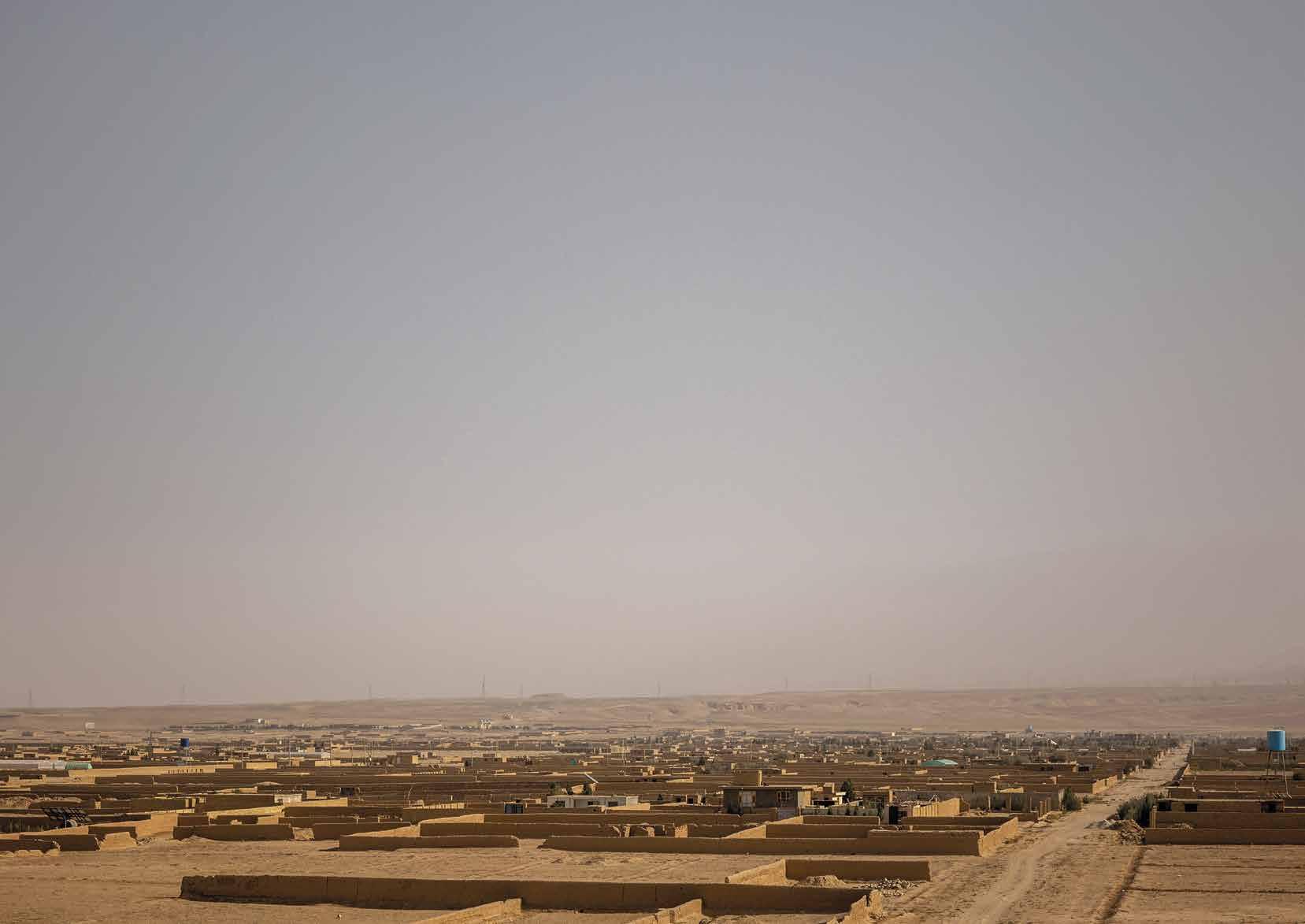
Among other activities, DEC member charities will:
■ provide food packages and cash for buying food
■ provide winterisation support (cash assistance to buy blankets, warm clothes, etc) in areas facing harsh winter conditions
■ provide multipurpose cash assistance for families to spend on their priority needs
■ provide cash-for-work opportunities, including for women
■ provide training and cash assistance for livelihoods and small business development, including for women
■ provide training in climate-smart agriculture and equipment and grants for livestock and vegetable production
■ establish mobile health units to provide primary healthcare services including maternal, newborn, and reproductive health services
■ train community health workers
■ train community volunteers to screen children and pregnant and lactating women for malnutrition and provide treatment where required
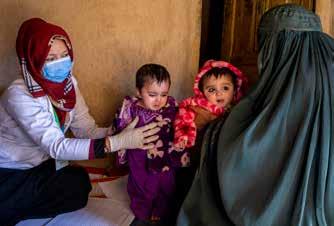
■ provide mental health and psychosocial services through phone and in-person support
■ provide safe spaces for women, children, people with disabilities, and other vulnerable people
■ establish community-based child protection committees to address and respond to child safety issues
■ rehabilitate water points including water and sanitation facilities in schools
■ provide hygiene and dignity kits and hygiene awarenessraising and training sessions. DEC member charities still face significant operational challenges in delivering humanitarian aid in Afghanistan. But with the generous support of the UK public, we remain committed to helping the most vulnerable people in Afghanistan to navigate the current crisis and begin to rebuild for the future.
27 26
55,300 individuals to be screened for malnutrition and receive treatment and advice where necessary 264,000 people to be provided with primary healthcare and nutrition services 11,700 people to be assisted with restoring their livelihoods, for example through training in climate-smart agriculture 170,000 people to be reached through hygiene promotion messaging 4,700 households to be provided with food packages to meet their essential food needs 46,900 households to benefit from cash assistance, which they can choose how to spend according to their needs 22% Multi-purpose cash assistance 21% Livelihoods 17% Food assistance 15% Water, sanitation & hygiene 15% Health 5% Other 3% Shelter 2% Nutrition 22% Multi-purpose cash assistance 21% Livelihoods 17% Food assistance 15% Water, sanitation & hygiene 15% Health 5% Other 3% Shelter 2% Nutrition Phase 2 budget £16.9 million THE TASK AHEAD Phase 2 planned response July 2022 to December 2023 Dr Suraya Sharifi, a nutrionist screener, assesses patients at a mobile health clinic in Daykundi province. © Arete/Action Against Hunger © Save The Children 4 Georgetown Institute for Women, Peace and Security Women, Peace, and Security Index 2021/22: Tracking sustainable peace through inclusion, justice, and security for women, 2021. Phase 2 planned expenditure by sector
HOW THE DEC WORKS
The DEC brings together 15 of the UK’s leading aid charities to raise funds at times of significant humanitarian need overseas. It allocates appeal funds to its members and ensures that the generous donations of the UK public are spent where the need is greatest. This means providing immediate emergency aid for communities devastated by humanitarian crises as well as providing long-term support to help these communities rebuild their lives and strengthen their resilience.
Donating through the DEC is simple and effective. It removes unnecessary competition for funding between aid charities, reduces administration costs and improves coordination, collaboration, and efficiency. Over the past five years, the DEC has provided support to communities in Afghanistan, Bangladesh, DRC, Ethiopia, Hungary, India, Indonesia, Kenya, Malawi, Moldova, Mozambique, Pakistan, Poland, Romania, Somalia, South Sudan, Syria, Ukraine, Yemen, and Zimbabwe.
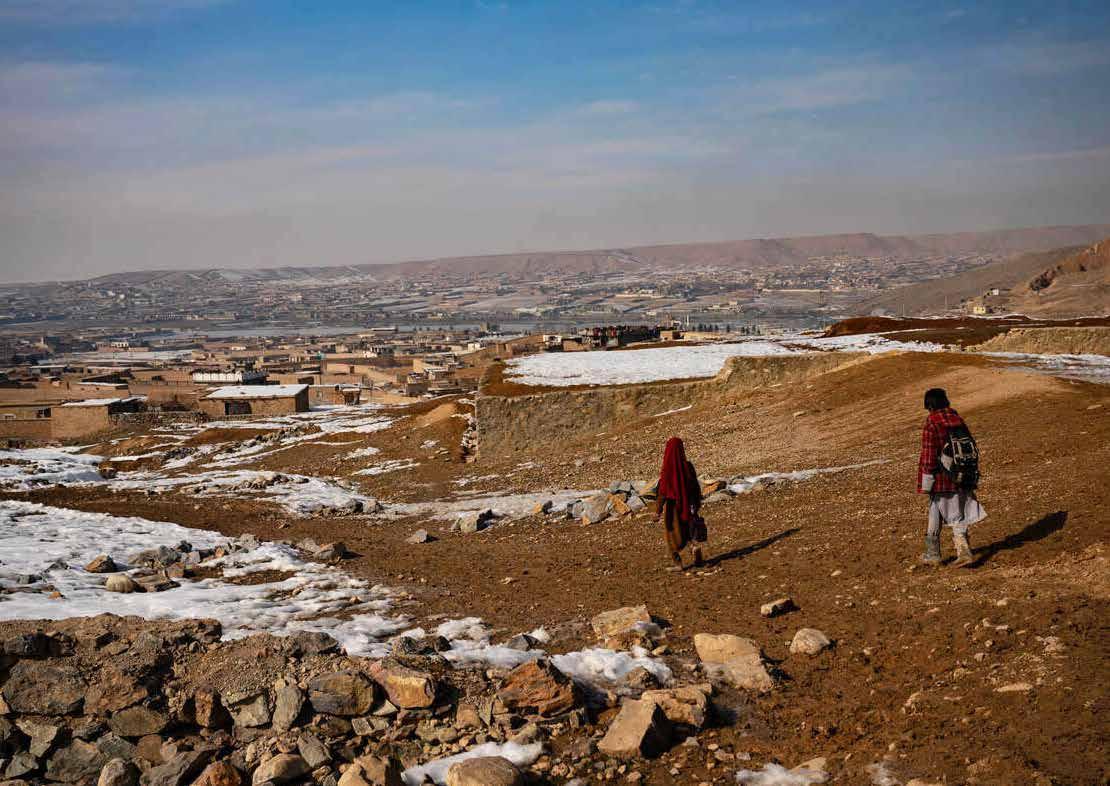
28 29
HOW THE DEC WORKS © Save The Children
DISASTERS EMERGENCY COMMITTEE
17-21 Wenlock Road London N1 7GT Tel: 020 7387 0200 www.dec.org.uk
Registered Charity No. 1062638 Company No. 3356526
